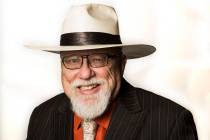Think ahead to prevent falls
It was 2005 and retired Gen. Paul Tibbets, who led the A-bomb mission on Hiroshima, sat in the living room of his Ohio home and spoke about the role the Wendover airfield on the Nevada-Utah border played in the planning of the first use of the atomic bomb.
As he talked, he often twisted in his chair and grimaced.
After the interview, I learned from Tibbets’ wife he had recently broken several vertebrae when he fell from a ladder as he moved a bookcase.
Andrea Tibbets said she called a man to move the bookcase but he wouldn’t do it on her husband’s timeline.
You’d think, she said, that at 90 he would have finally learned some patience.
When I hear about the falls of older adults — the Centers for Disease Control and Prevention reports that each year one in every three adults 65 and older falls — I think about Tibbets and others who war against aging.
Sound of mind, these individuals, whose careers and raising of children only whetted their appetites for enjoying more of life, are not about to give up what’s at their core.
Tibbets, for example, was a man long used to getting things done NOW. In my conversation with his wife, she went on to berate herself, saying she should have known a man with little patience wouldn’t suddenly gain it because he was older.
She was right.
“We are who we are and age doesn’t change personality,” said Dr. Dale Carrison, the 74-year-old head of emergency at University Medical Center. “But behavior can be changed. For children worried about parents, communication is key.”
With National Falls Prevention Day on Sept. 22 and experts lining up to talk about reducing hazards that range from cluttered floors to disorienting medications — call 702-759-1268 or click www.gethealthy.org about events planned by the Nevada Goes Falls Free Coalition — it’s also instructive to understand how to deal with elders who too often dismiss the fact that what was once simple can now put them in harm’s way.
People learning to deal with such a mindset can help loved ones avoid a trip to the hospital.
“We see too many older people in trauma who’ve been on ladders putting up Christmas lights, ” Carrison said.
Respectful conversations can often head off mishaps. Never, 91-year-old Army Air Corps retiree Herb Gilbert of Las Vegas told me, should someone engage in “elderspeak,” talking needlessly slow and loud because of an individual’s chronological age, patronizing him or her with a “sweetie” or “dear.”
“Condescension gets you nowhere,” Gilbert said. “We can reason. We’re not dumb.”
Given his age, Carrison said he has no problem convincing senior citizens that change makes sense.
He tells them the truth — that he’s like them, like most older people scientists study — balance, sight and coordination have diminished.
“I’ll tell them we have to modify behavior if we don’t want to end up in the hospital, and they understand,” he said. When he tells them “we’ve earned the right” to have someone else go up on the roof to hang Christmas lights, Carrison said seniors agree.
There’s no reason, Carrison said, that a son or daughter, in suggesting to parents they hang the Christmas lights, can’t mention to them that they’ve earned that help, that they’re not giving something up. Children generally know, he said, when a parent is going to do something that may be dangerous. “They can get it done early,” he said.
Carrison tells young doctors to find a way to relate to older adults, such as ensuring the difficult times experienced by their own parents or relatives becomes part of sharing medical data on aging to a patient.
“If older people realize you’re being honest and not patronizing, they do what’s right,” he said.
Both doctors and family members, Carrison said, are well served by knowing facts about falls found on the CDC website at www.cdc.gov. When older adults hear that falls are the leading cause of injury deaths for those over 65, they listen, Carrison said.
Still, like Tibbets, who died in 2007, many older adults want things done on their timelines, so reasoning can fall by the wayside. That means family needs to put up Christmas lights by, say, Dec. 10 if that’s when Grandpa did it. Otherwise, he’ll do it. And break a hip. It means Mrs. Tibbets might’ve had to pay double to move the bookcase when her husband wanted it done. Otherwise, as happened, he did it. And broke his back.
“Most seniors don’t mind someone else doing something, they’ve earned that,” Carrison said. “But they want it done when they want it done. Families worried about their safety need to keep that in mind.”
Contact reporter Paul Harasim at pharasim@reviewjournal.com or 702-387-2908.

















